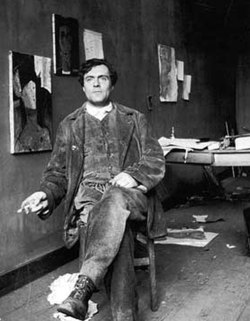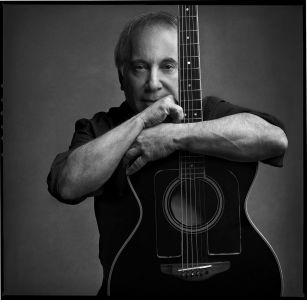
I've been intrigued by Modigliani for quite some time. It took me a while to appreciate his portraits--particulary since so many of them are of naked women. The ones that weren't nudes seemed simplistic and almost formulaic. But they weren't forgettable--I went back to them, and found a sense of depth that I hadn't experienced initially.

There's an underlying sense of something unsettling in his work that made me want to explore further. It's not unsettling in a repulsive or maddening way--like Georgia O'Keefe (whose thinly veiled representations of female genitalia as flowers just don't do it for me, and who, on the "annoying" meter, ranks one step above Thomas Kincade) or Jackson Pollock, whose work I guess I just don't get; it bores me. Modigliani's work is unsettling in a way that says "there's more here than meets the eye, but you're gonna have to delve."
So I started reading about Modi, and found his life even more interesting than his work. Modigliani, it seems, was a Beatnik nearly a half-century before Kerouac began typing on that now-famous continuous roll of paper. Modi was a bohemian whose life was full of passion and craziness and torment. He died at the age of 35. His grief-sticken lover, nine months pregnant with their second child, jumped out a fifth-floor window and killed herself and their unborn child two days later, leaving their baby daughter an orphan.

I look at his work a lot differently now. It makes such a difference when you know a bit about the life of an artist--it helps you see things you may not have noticed. But there is a fine line between knowing about an artist and having some perspective, and making assumptions and reading into his or her art. It's a fine--and interesting--line.
In the same way, I've been fascinated with the Norwegian artist Edvard Munch (the Poe of painting) even longer, perhaps because I relate to the nostalgie de la boue aspect of his art, with its themes of loss and longing. Of course, I've always been familiar with The Scream, but I've found many of his other sketches and paintings more compelling. Death and the Maiden, The Kiss--some are just so powerful.

And then there is Klimt, the Austrian symbolist painter who, in my opinion, was decades ahead of his time. Klimt can take the most haunting, melancholy aspects of life and render them visually vibrant and beautiful, but he does it in a way that deepens the drearier, more philosophical aspects of mortality and the human condition. He paints almost like a mosaicist and, though some of his work tends toward the erotic--even bordeline perverse--the meticulous detail in itself is worth studying; you can look at The Three Ages of Woman a thousand times, for instance, and never see it the same way twice.


As much as I tend toward the melancholy, for the past year or so, I've become immersed in the colorful work of Matisse, the color master. Seeing his work at MoMA stirred something in me. I know he is considered as significant as Picasso--and honestly, he is leaving Picasso in the dust for me--but I only stumbled upon his work inadvertently, so I am excited that there is a whole new world I haven't yet discovered. To me, his subjects and his composition are almost secondary to his color.

Because of Matisse, I have opened up to Fauvism, which I really am drawn to. Just this past spring, I found out that there is a Matisse stained-glass window at the Union Church of Pocantico Hills, less than 10 minutes away from my house, and that it was his last work of art before his death. I've been wanting to go for months, but it's hard to rally my guys during football season.

I'm also relatively new to Marc Chagall. I'm not a fan of Cubism by anyone, even Picasso--it's one of those things that I just don't "get" so I've stopped trying, and maybe one day it will "get" me--but I do love his themes, symbolism, and color. Chagall, like Matisse, also has a window at Union Church which I'm hoping to see. I love his Fiddler because--well, he's a fiddler!









